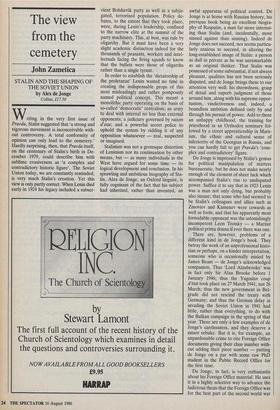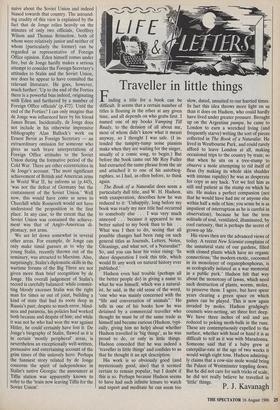The view from the cemetery
John Zametica
STALIN AND THE SHAPING OF THE SOVIET UNION by Alex de Jonge
Collins, £17.50
Writing in the very first issue of Pravda, Stalin suggested that 'a strong and vigorous movement is inconceivable with- out controversy. A total conformity of opinion can only lead to the cemetery.' Hardly surprising, then, that Pravda itself, on the centenary of Stalin's birth in De- cember 1979, could describe him with sublime evasiveness as 'a complex and contradictory historic figure'. The Soviet Union today, we are constantly reminded, is very much Stalin's creation. Yet this view is only partly correct. When Lenin died early in 1924 his legacy included a subser- vient Bolshevik party as well as a subju- gated, terrorised population. Policy de- bates, to the extent that they took place, were, during Lenin's leadership, confined to the narrow elite at the summit of the party machinery. This, at best, was rule by oligarchy. But it must have been a very slight academic distinction indeed for the thousands of peasants, workers and intel- lectuals facing the firing squads to know that the bullets were those of oligarchs rather than a single tyrant.
In order to establish the 'dictatorship of the proletariat' Lenin wasted no time in creating the indispensable props of this most misleadingly and rather pompously named political concept. This meant a monolithic party operating on the basis of so-called 'democratic' centralism; an army to deal with internal no less than external opponents; a judiciary governed by raison d'etat; and a powerful secret police to uphold the system by ridding it of any opposition whatsoever — real, suspected or imagined.
Stalinism was not a grotesque distortion of Leninism nor its continuation by other means, but — as many individuals in the West have argued for some time — its logical development and conclusion. In his sprawling and ambitious biography of Sta- lin, Alex de Jonge, an Oxford linguist, is fully cognisant of the fact that his subject had inherited, rather than invented, an awful apparatus of political control. De Jonge is at home with Russian history, his previous book being an excellent biogra- phy of Rasputin, a man far more interest- ing than Stalin (and, incidentally, more sinned against than sinning). Indeed de Jonge does not succeed, nor seems particu- larly anxious to succeed, in altering the long-established image of Stalin: a person as dull in private as he was unremarkable as an original thinker. That Stalin was possessed of some substantial, if not always pleasant, qualities has not been seriously disputed, and de Jonge brings these to our attention very well: his shrewdness, grasp of detail and superb judgment of those around him, along with his supreme oppor- tunism, vindictiveness and, indeed, a boundless ambition defined only by and through his pursuit of power. Add to these an unhappy childhood, the training for priesthood in an Orthodox seminary fol- lowed by a street apprenticeship in Marx- ism, the ethnic and cultural sense of inferiority of the Georgian in Russia, and you can hardly fail to get Pravda's 'com- plex and contradictory' figure.
De Jonge is impressed by Stalin's genius for political manipulation of matters bureaucratic, but he does not make nearly enough of the element of sheer luck which accompanied Stalin's rise to undisputed power. Suffice it to say that in 1923 Lenin was a man not only dying, but probably also insane; that some who had seemed to be Stalin's colleagues and allies such as Zinoviev and Kamenev were cowards as well as fools; and that his apparently most formidable opponent was the astonishingly incompetent Leon Trotsky — a Marxist political prima donna if ever there was one.
There are, however, problems of a different kind in de Jonge's book. They betray the work of an unprofessional histo- rian or perhaps, on a kinder interpretation, someone who is occasionally misled by James Beam — de Jonge's acknowledged companion. Thus 'Lord Alanbrooke' was in fact only Sir Alan Brooke before 1 January 1946; thus the Yugoslav coup d'etat took place on 27 March 1941, not 26 March; thus the new government in Bel- grade did not rescind the treaty with Germany; and thus the German delay in invading the Soviet Union in 1941 had little, rather than everything, to do with the Balkan campaign in the spring of that year. These are only a few examples of de Jonge's carelessness, and they deserve a minor rebuke. But it is, for example, an unpardonable crime to cite Foreign Office documents giving their class number with- out adding their piece number — putting de Jonge on a par with some raw PhD student in the Public Record Office for the first time.
De Jonge, in fact, is very enthusiastic about his Foreign Office material. He uses it in a highly selective way to advance the ludicrous thesis that the Foreign Office was for the best part of the second world war naive about the Soviet Union and indeed biased towards that country. The astound- ing crudity of this view is explained by the fact that de Jonge relies heavily on the minutes of only two officials, Geoffrey Wilson and Thomas Brimelow, both of whom were relatively junior and neither of whom (particularly the former) can be regarded as representative of Foreign Office opinion. Eden himself comes under fire, but de Jonge hardly makes a serious attempt to consider the Foreign Secretary's attitudes to Stalin and the Soviet Union, nor does he appear to have consulted the relevant literature. He goes, however, much further: 'Up to the end of the Forties there is a powerful bias indeed, originating with Eden and furthered by a number of Foreign Office officials' (p.472). Until the end of the Forties? I can only imagine that de Jonge was influenced here by his friend James Beam. Incidentally, de Jonge does not include in his otherwise impressive bibliography Alan Bullock's work on Ernest Bevin as Foreign Secretary — an extraordinary omission for someone who gives us such brave interpretations of Foreign Office attitudes to the Soviet Union during the formative period of the Cold War. There are other eccentricities in de Jonge's account. 'The most significant achievement of British and American arms in World War II, he informs us (p.443), 'was not the defeat of Germany but the containment of the Soviet Union.' Well now, this would have come as news to Churchill while Roosevelt would not have understood the proposition in the first place. In any case, to the extent that the Soviet Union was contained the achieve- ment was that of Anglo-American di- plomacy, not arms.
We are let down somewhat in several other areas. For example, de Jonge can only make timid guesses as to why the young Stalin, recently thrown out of the seminary, was attracted to Marxism. Also, surprisingly, Stalin's diplomatic skills in the wartime forums of the Big Three are not given more than brief recognition by de Jonge. His overall judgement of Stalin's record is carefully balanced: while commit- ting bloody excesses Stalin was the right man for times so out of joint, building a kind of state that had its roots deep in Russia's past; despite so much error, blind- ness and paranoia, his policies had worked both because and despite of him; and while it was not he who had won the war against Hitler, he could certainly have lost it. De Jonge's biography of Stalin, flawed as it is in certain 'mostly peripheral' areas, is nevertheless an exceptionally well-written, persuasive and entertaining account of the grim times of this unlovely hero. Perhaps the funniest story related by de Jonge concerns the spirit of independence in Stalin's native Georgia: the announcer at Tiflis station was apparently known to refer to the 'train now leaving Tiflis for the Soviet Union'.











































 Previous page
Previous page